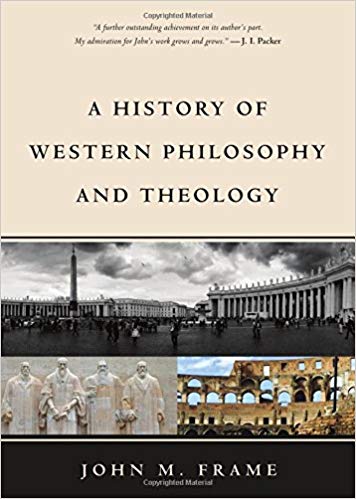Recommended Reading
From Amazon.com: "Christians should evaluate philosophy by biblical criteria. This will shed greater light on the developments in the history of philosophy and better prepare us for the intellectual challenges of our time. The fall of Adam brought intellectual as well as moral corruption on the human race, and the effects of the fall can be seen in the work of philosophers, most of whom try to understand the world autonomously through reasoning apart from God's revelation. Some philosophers have appealed to God's revelation, but their work has often been compromised with the wisdom of the world. Revelation should inform reason, and not the other way round. In the past, even Christian theology was corrupted by the movement toward intellectual autonomy, creating the tradition of liberalism, which has unhappily dominated academic theology down to the present day. But there is hope a new generation of Christian thinkers take God's Word seriously. Frame's unique new contribution augments that process."
If you purchase from one of our Amazon.com links, we receive a small commission that helps support this site and does not cost you any extra.
What Is Seminary?
What is seminary? You might find yourself asking this question if you're new to theological education or just aren't sure what's involved in preparing for ministry.

Seminary Defined
Simply put, a seminary is an institution of higher learning devoted to theological education. The vast majority of seminaries are Christian, specifically protestant. However, there's no shortage Catholic seminaries as well. Although the term is generally associated with Christian institutions, it can apply to Jewish schools of theological education as well. So, the answer to "What is Seminary" is simple - it refers to graduate theological education.
Focus of this Site
This site focuses specifically on Christian,
Protestant seminaries in the United States. That's not to say, of
course, that other seminaries aren't worth exploring or considering.
However, I have specifically chosen to limit this site's focus because
of my own experiences and areas of expertise. I'm a graduate of a
mainline protestant seminary and those are the types of schools I
generally researched, with one exception.
Difference Between Seminary and Divinity Schools
Although
this isn't a hard and fast rule, generally "Divinity Schools," which
are also part of this site's focus, have a broader, more ecumenical
representation. A Divinity School, such as Harvard, Yale, or Vanderbilt,
will have a wide range of students from many different theological and
philosophical backgrounds, some who don't even espouse any religious
belief but who are interested in studying theology from an academic
standpoint.
Seminary Preparation
Traditionally, seminaries
have prepared their students for various types of ministry. One may
attend seminary to prepare for a career in ministry in various
capacities, such as a senior pastor, youth director, or music minister.
Others attend seminary as preparation for teaching in religious-based
high schools or to prepare for further graduate study in theology or a
related fields. Still others attend seminary to explore discovering
their call, whether it be to traditional parish ministry or some other
kind of service.
Degrees Offered
Traditionally, most
seminaries offer a Master of Divinity degree (MDiv), a three year
foundational degree in theology where a student takes a variety of
courses, both practical and academic. Some schools offer the more
easily-recognized MA in a variety of fields, with some schools even
offering dual MDiv/MA programs.
Many seminaries and divinity
schools also offer an MTS (Master of Theological Studies) degree, which
is a specialized theology degree as well as a ThM (Master of Theology).
For more advanced students, there is the DMin (Doctor of Ministry), ThD
(Doctor of Theology), and PhD (Doctor of Philosophy).
A Versatile Degree
Although most students who attend a seminary do so to prepare for traditional church ministry, a seminary education is excellent preparation for further graduate work in a variety of fields or preparation for work in the non-profit sector. The education is varied enough that graduates find themselves working in areas they never dreamed of . . . including building websites such as this one. :)

